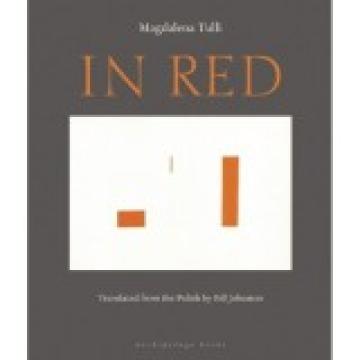IN RED by Magdalena Tulli
The mythical town of Stitchings is coming apart at the seams: unfortunate deaths riddle the town, snow never melts, the people are preoccupied with war, and monkeys from a traveling circus have put counterfeit money into circulation, ruining the local economy. In Magdalena Tulli's In Red (Archipelago Books), beautifully translated from the Polish by Bill Johnston, we follow the evolution of a small, dreamlike town that itself is the novel's protagonist just as much as it is its antagonist.
Characters come and go in this small, 158-page novel, dying—from falling sculptures, strange ailments, war—almost as soon as they are introduced. It's a strange book, and a hard one to classify, especially because a traditional “plot” as such doesn't really exist. Rather, the reader is encouraged to become invested in the fate of Stitchings itself and not its characters, even as one begins to wonder whether the town might not be cursed.
The book opens in the middle of a perpetual winter at an unspecified time in the past, when Stitchings is dark for most of the day except for a brief dawn and dusk around lunchtime. We're introduced to three family-run local merchants: Strobbel, who makes porcelain; Neumann, who makes music records; and Loom & Son, who handles the money and the merchandise in the town. For the first time in generations, Loom does not have a son to pass the company along to, and instead has a daughter, the beautiful Emilka, who is pursued by two suitors: Kazimierz Krasnowolski, a soldier, and Augustus Strobbel, nephew of the porcelain factory's owner and its heir. But within the first several pages, although it seems that the story might focus on Emilka, she dies unexpectedly—but refuses to die. Instead, the “dead” Emilka stays locked up in her room reading illicit romance novels while the town moves on.
As Stitchings goes from being a war zone to a tourist attraction to a bustling factory town to a town full of degenerates, and as the perpetual night gives way to perpetual day and back to perpetual night again, it's clear that it's is a strange place populated by strange people. “Perishing will be difficult, I like that!” a colonel says in the beginning of the book to a confused Kazimierz, before they both end up dying. “At the last hour, bang, you fall down, and it's all over. It's the easiest of all the things we have to do in this life.”
And it is in fact the ease and unceremoniousness of their deaths—and the dreamy, nearly fantastical way Tulli renders the people and the setting—that makes the book so different. Eventually all the characters' desires and, in fact, all their deaths prove to be the key to understanding the town. The book is divided into three sections, each delving into the psyche of Stitchings and its attempts to deal with the chaos that befalls it. It reads like some sort of perverse fairytale, and whether through war and confrontation, through greed, or through drunkenness and debauchery, the citizens of Stitchings ultimately cannot stave off the literal and figurative winter that enshrouds them.
But In Red is not necessarily a dark book, nor a sad one. At times it's clever and funny, and at others bitterly wry. This is Tulli's fourth book translated into English, and her previous work has been met with much acclaim both in the United States and in Poland. Much credit should be given to Johnston, whose laudable translation lends In Red the mythical tone and texture that the world of Stitchings demands. At times, however, the language of In Red seems stilted, especially when it comes to tenses, which are used much more fluidly in Polish than in English.
Nonetheless, the translation brilliantly renders Tulli's careful prose and conveys the strangeness of In Red. It's a difficult book to wrap your head around, but once you dig into it, it's remarkably fresh and enjoyable—a meditation on human desire, as well as on life, death, and the inevitable interaction between the two.
Magdalena Tulli lives in Warsaw and works as a writer and translator. She has published four books, and In Red is the last of them to be made available in English. Tulli won Poland's prestigious Koscielski Foundation Prize in 1995, was nominated for the International IMPAC Dublin Literary Award in 2006, and in 2007 was shortlisted for the Nike Prize, Poland's highest literary award.

 Iza Wojciechowska is finishing an MFA in creative nonfiction and literary translation at Columbia University. Her writing and translations from Polish have appeared in Hayden's Ferry Review, InTranslation, Sweet, and The Millions, among others. She's working on a nonfiction book about war, art, family, and a Polish palace.
Iza Wojciechowska is finishing an MFA in creative nonfiction and literary translation at Columbia University. Her writing and translations from Polish have appeared in Hayden's Ferry Review, InTranslation, Sweet, and The Millions, among others. She's working on a nonfiction book about war, art, family, and a Polish palace.